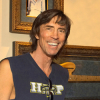Tom Scholz

Tom Scholz
Donald Thomas "Tom" Scholzis an American rock musician, inventor, engineer, and philanthropist, best known as the founder of the band Boston. He is also the inventor of the Rockman portable guitar amplifier. He has been described by Allmusic as "a notoriously 'un-rock n' roll' figure who never enjoyed the limelight of being a performer," preferring to concentrate almost exclusively on his music, and in more recent years, spending much of his time working with charities...
NationalityAmerican
ProfessionRock Singer
Date of Birth10 March 1947
CityToledo, OH
CountryUnited States of America
I'm never too ambitious when I go into the studio. I always know that I'm just going into the studio to work on or try to develop an idea that I have for a song.
Someone will say, 'Well, that's good enough.' As soon as I hear 'Good enough,' it really bothers me. I spend as much time as I think I can on anything I do. I try to do that with the people that work with me. I try to get the best out of them.
The studio work is the nasty, tedious, hard and nerve-wracking part, interrupted by moments of exhilaration. Playing live is the chance to actually have some fun and get on a stage.
'Life, Love & Hope' is... I'm thinking 'larger picture.' I'm not trying to preach to anyone. We all get lost and caught up in our everyday problems. Your cellphone doesn't work or you got a parking ticket, you had a bad day at work. You can lose sight of the really important things in life; that's what the song is about.
There aren't a lot of cover bands that do Boston material or do it well, and the reason for that is that they are hard to play. So we put a lot of work into it. The musicians that I've managed to surround myself with after all of these years are individuals who really excel at what they do.
Fun is when you're writing a song and you're trying a rough shot at a demo and... it works. That's when it's fun. After that, it's work.
I don't work out a lead section and practice it for a day and then lay it down. I don't do that. The first time I do something I think is expressive or really cool, that's what's actually on the recording.
The lyrics are always the last thing I do. I always have a recording of basic tracks and maybe some of the lead work. I'll sit back and listen to it, and I'll just concentrate on what kind of feeling it gives me. My goal writing the lyrics is to not disrupt that feeling.
I'm not one of those artists who doesn't want to play their most popular songs.
I'm one of those artists that doesn't actually hate my old hits. I love Boston music. I really like 'More than a Feeling.' After playing it to myself in a basement for such a long time, I'm happy to do it out on stage.
The whole experience of getting an album from an artist you like and listening to it from beginning to end is sort of gone. Now it's piecemeal.
The music that I wrote and recorded is music that I really enjoy listening to. It's just dumb luck that a lot of other people do, too.
The one thing I will say for digital, and you won't hear me say that many complimentary things about it, is that it's cheap. It pretty much enables anybody to record as long as you can deal with the sound.
I would be involved with music whether I had a career or not. I'm always going to be writing songs and recording them.